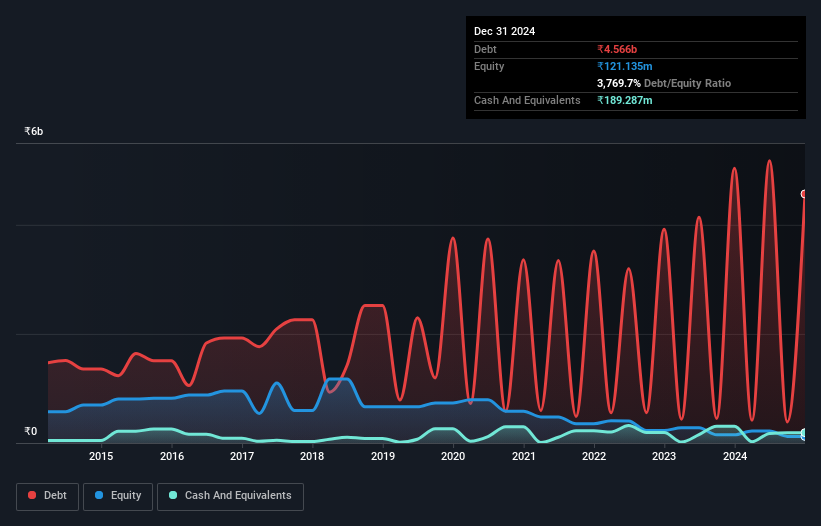- India
- /
- Energy Services
- /
- NSEI:GLOBALVECT
We Think Global Vectra Helicorp (NSE:GLOBALVECT) Is Taking Some Risk With Its Debt

Warren Buffett famously said, 'Volatility is far from synonymous with risk.' So it seems the smart money knows that debt - which is usually involved in bankruptcies - is a very important factor, when you assess how risky a company is. Importantly, Global Vectra Helicorp Limited (NSE:GLOBALVECT) does carry debt. But the real question is whether this debt is making the company risky.
What Risk Does Debt Bring?
Debt is a tool to help businesses grow, but if a business is incapable of paying off its lenders, then it exists at their mercy. Part and parcel of capitalism is the process of 'creative destruction' where failed businesses are mercilessly liquidated by their bankers. However, a more frequent (but still costly) occurrence is where a company must issue shares at bargain-basement prices, permanently diluting shareholders, just to shore up its balance sheet. Of course, plenty of companies use debt to fund growth, without any negative consequences. The first thing to do when considering how much debt a business uses is to look at its cash and debt together.
What Is Global Vectra Helicorp's Net Debt?
The image below, which you can click on for greater detail, shows that Global Vectra Helicorp had debt of ₹4.57b at the end of September 2024, a reduction from ₹5.04b over a year. On the flip side, it has ₹189.3m in cash leading to net debt of about ₹4.38b.

How Healthy Is Global Vectra Helicorp's Balance Sheet?
According to the last reported balance sheet, Global Vectra Helicorp had liabilities of ₹4.78b due within 12 months, and liabilities of ₹3.77b due beyond 12 months. On the other hand, it had cash of ₹189.3m and ₹693.1m worth of receivables due within a year. So it has liabilities totalling ₹7.67b more than its cash and near-term receivables, combined.
The deficiency here weighs heavily on the ₹3.68b company itself, as if a child were struggling under the weight of an enormous back-pack full of books, his sports gear, and a trumpet. So we definitely think shareholders need to watch this one closely. After all, Global Vectra Helicorp would likely require a major re-capitalisation if it had to pay its creditors today.
See our latest analysis for Global Vectra Helicorp
We measure a company's debt load relative to its earnings power by looking at its net debt divided by its earnings before interest, tax, depreciation, and amortization (EBITDA) and by calculating how easily its earnings before interest and tax (EBIT) cover its interest expense (interest cover). This way, we consider both the absolute quantum of the debt, as well as the interest rates paid on it.
Global Vectra Helicorp shareholders face the double whammy of a high net debt to EBITDA ratio (16.6), and fairly weak interest coverage, since EBIT is just 0.56 times the interest expense. This means we'd consider it to have a heavy debt load. The good news is that Global Vectra Helicorp grew its EBIT a smooth 33% over the last twelve months. Like a mother's loving embrace of a newborn that sort of growth builds resilience, putting the company in a stronger position to manage its debt. When analysing debt levels, the balance sheet is the obvious place to start. But you can't view debt in total isolation; since Global Vectra Helicorp will need earnings to service that debt. So when considering debt, it's definitely worth looking at the earnings trend. Click here for an interactive snapshot.
Finally, a business needs free cash flow to pay off debt; accounting profits just don't cut it. So we always check how much of that EBIT is translated into free cash flow. Over the last two years, Global Vectra Helicorp actually produced more free cash flow than EBIT. That sort of strong cash generation warms our hearts like a puppy in a bumblebee suit.
Our View
To be frank both Global Vectra Helicorp's interest cover and its track record of staying on top of its total liabilities make us rather uncomfortable with its debt levels. But on the bright side, its conversion of EBIT to free cash flow is a good sign, and makes us more optimistic. Looking at the balance sheet and taking into account all these factors, we do believe that debt is making Global Vectra Helicorp stock a bit risky. Some people like that sort of risk, but we're mindful of the potential pitfalls, so we'd probably prefer it carry less debt. There's no doubt that we learn most about debt from the balance sheet. However, not all investment risk resides within the balance sheet - far from it. Be aware that Global Vectra Helicorp is showing 2 warning signs in our investment analysis , and 1 of those shouldn't be ignored...
Of course, if you're the type of investor who prefers buying stocks without the burden of debt, then don't hesitate to discover our exclusive list of net cash growth stocks, today.
New: Manage All Your Stock Portfolios in One Place
We've created the ultimate portfolio companion for stock investors, and it's free.
• Connect an unlimited number of Portfolios and see your total in one currency
• Be alerted to new Warning Signs or Risks via email or mobile
• Track the Fair Value of your stocks
Have feedback on this article? Concerned about the content? Get in touch with us directly. Alternatively, email editorial-team (at) simplywallst.com.
This article by Simply Wall St is general in nature. We provide commentary based on historical data and analyst forecasts only using an unbiased methodology and our articles are not intended to be financial advice. It does not constitute a recommendation to buy or sell any stock, and does not take account of your objectives, or your financial situation. We aim to bring you long-term focused analysis driven by fundamental data. Note that our analysis may not factor in the latest price-sensitive company announcements or qualitative material. Simply Wall St has no position in any stocks mentioned.
About NSEI:GLOBALVECT
Global Vectra Helicorp
Offers helicopter charter services for offshore and onshore transportation in the oil and gas exploration and production sector in India.
Good value low.
Market Insights
Community Narratives




